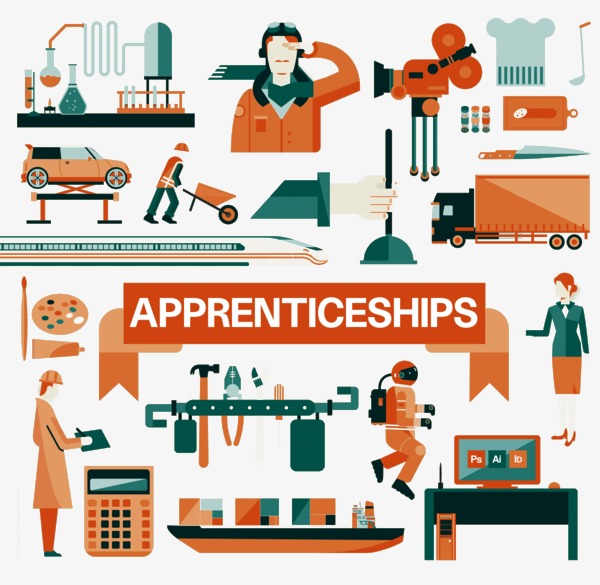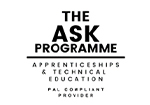Choosing between pursuing a degree or an apprenticeship can be a pivotal decision in your career journey. Both paths offer unique advantages and can lead to successful and fulfilling careers.
In this blog we will explore the key differences, benefits, and considerations for each option.
The Degree Route
- Academic Focus: Studying for a degree at university typically focuses on theoretical knowledge and academic learning. It provides a broad understanding of a subject area, often including research and critical thinking skills.
- Duration and structure: Degree programmes usually take 3 to 4 years depending on the field of study. Four year programmes can include an industrial placement or work placement year. The time spent at university will follow a structured curriculum with lectures, seminars and exams.
- Career opportunities: A degree can open the door to a range of careers, especially those that require specialised, in-depth knowledge such as engineering, medicine, law and veterinary science. Some careers also require a degree as an entry level and is the only route into that career area e.g. psychiatry and becoming a barrister. In addition, many employers value the comprehensive study that a graduate has undertaken.
- Networking and social experience: University life offers the opportunity for a wide social network including peers, teaching staff and industry professionals. This can be hugely beneficial in personal growth and building independence in preparation for the onward transition into the world of work.
- Financial implications: studying for a degree can be expensive due to paying tuition fees, living expenses and course materials. Student loans, grants and scholarships are available to help manage these costs, but loans will need to be repaid post-graduation.
The Apprenticeship Route
- Hands-on experience: An Apprenticeship combines on-the-job training with study to gain qualifications. Apprentices gain work experience, practical skills alongside experienced professionals in their chosen field.
- Earn while you learn: as an apprentice you will be earning a salary whilst learning. This can make it a more financially viable to acquire the training needed to qualify in a particular profession.
- Duration and structure: The duration of an apprenticeship can vary depending on the level of qualification and on the industry. Typically, a higher apprenticeship at level 4 or 5 can take 18- 24 months whereas a degree apprenticeship can take 3 to 4 years with some apprenticeships taking much longer e.g. a Level 6 Solicitor apprenticeship takes 6 years to reach completion. All apprenticeships are structured with a framework that provides a balance between work and study, with sometimes four working days and one study day per week but often study can be done in blocks. Study could also be done either in person or remotely.
- Career opportunities: There are some industries where apprenticeships are highly regarded which can often lead to full-time employment with a defined career path.
- Industry networks: Apprenticeships offer connections to the world of work offering the opportunity to build relationships with employers and colleagues which can in turn, increase your employability.
So how do I find out what is right for me?
Making the decision between studying for a degree or an apprenticeship will require consideration of several factors including:
- Career goals: Think about the career that you want to pursue, and the qualifications required. Some careers will require you to be degree qualified e.g. veterinary science. Other professions require a more practical approach and lend themselves to on-the-job training such as the construction trade.
- Learning style: Reflect on whether you learn best by doing or if you enjoy more theoretical study of a subject.
- Training costs: Consider the costs of doing the training required for your chosen career. An apprenticeship will not incur any study fees as you are being paid to work and learn whereas if you study a degree at university you will have to cover tuition fees.
- Long term prospects: Research the long-term career opportunities in your chosen field including starting salary and career advancement.

Choosing a university course: what to consider
If you are thinking of going to study at university, you'll be able to pick from a range of programmes, therefore keeping your options open, particularly if you are not sure what you want to do after graduation. Some of the things to consider when researching your degree course include:
- Course content
- Grades required
- Location
- Accommodation
- Campus or town location
- Teaching methods and delivery
- Assessment: exams coursework, practical assignments
- League table position
What careers can I access via an apprenticeship?
The scope of careers you can access via an apprenticeship is surprisingly broad. They are no longer dominated by manual trades such as construction and engineering - instead, they span a range of industries including:
- accountancy
- banking
- buisness
- creative careers
- engineering
- finance
- healthcare
- HR
- I.T.
- law
- marketing
- media
- retail
- sales
- social care
- transport
Ultimately, you should decide what your goals are, your learning style, the qualification route required in your chosen field as well as your circumstances. Take your time to explore your options so that you can make an informed decision that aligns with your career aspirations.
You can use the following to explore further and research your options:
Apprenticeship versus Degree: The Pros and Cons
Apprenticeships versus University - UCAS
The pros and cons of apprenticeships to guide your career
Ultimate Guides — Traditional Degrees versus Degree Apprenticeships
At FutureSmart Careers, we have trained professionals and our mission is to provide careers guidance, knowledge and resources so that young people can make confident and informed choices about their futures.
If you would like careers guidance or support for students in your school or college, please get in touch at: enquiries@futuresmarcareers.co.uk.
Sources:
Indeed
What career live
Images by Freepik



 0330 311 9509
0330 311 9509 




 0330 311 9509
0330 311 9509









